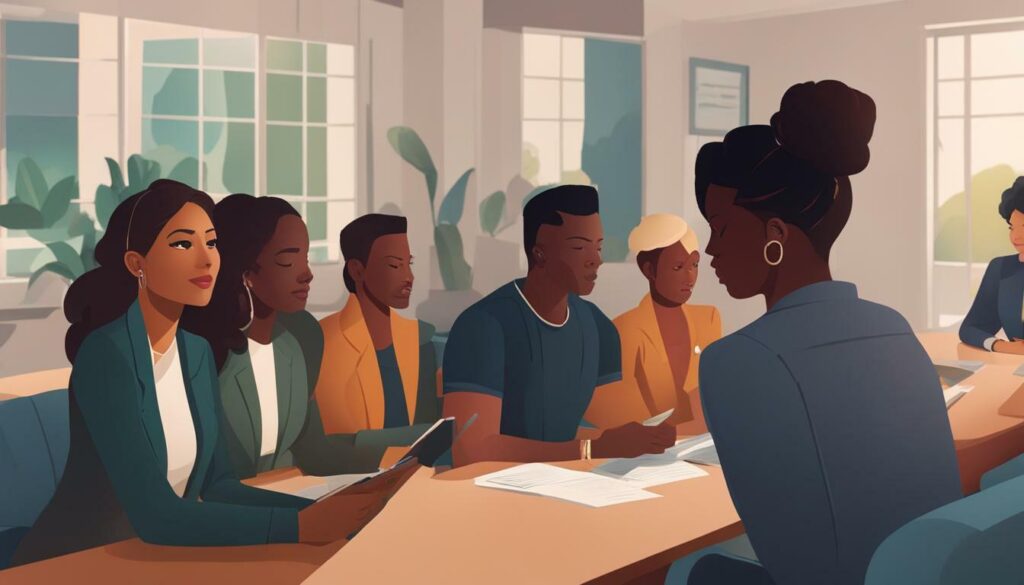Are you considering a career in counseling? Before you make a decision, it’s important to understand the potential disadvantages that come with this emotionally demanding yet rewarding profession. While counseling can offer a fulfilling opportunity to make a positive impact on others’ lives, it’s essential to be aware of the limitations and drawbacks that may arise.
- Counseling career models, such as the trait and factor model, the developmental model, the social learning model, and the constructivist model, have their own advantages and disadvantages.
- Systemic barriers and biases can affect clients’ career opportunities and outcomes, requiring counselors to address these issues and advocate for social justice and equity.
- Understanding career development theories, such as Frank Parson’s trait-factor model and Holland’s theory of vocational types, can help counselors support clients in exploring career options.
- Counseling is an emotionally demanding profession that may involve challenges, burnout, ethical dilemmas, professional isolation, and limited career advancement opportunities.
- Despite the disadvantages, counseling offers the opportunity to make a positive impact on individuals’ lives and contribute to their personal growth and well-being.
By being informed about the potential disadvantages of a counseling career, you can make a well-rounded decision and explore strategies to overcome challenges, promote social justice, and create a fulfilling and sustainable practice.
The Challenges of a Counseling Career
While counseling can be incredibly fulfilling, it’s crucial to recognize the challenges and negative aspects that come with the profession. Being aware of these challenges can help counselors navigate their career path more effectively and provide better support to their clients.
One of the main challenges counselors face is the emotional toll of the job. Dealing with clients’ personal struggles and trauma can be emotionally draining, leading to compassion fatigue and burnout. It’s important for counselors to prioritize self-care and seek support from colleagues and supervisors to prevent emotional exhaustion.
Another challenge in the counseling profession is the limited career advancement opportunities. Unlike some other fields, counseling may have fewer options for career growth and promotion. This can be discouraging for counselors who seek upward mobility or want to explore different areas of expertise.
The Emotional Demands of Counseling

Moreover, counselors often face the ethical challenges and legal responsibilities in their practice. They must navigate complex ethical dilemmas, maintain client confidentiality, and adhere to professional standards. Violating ethical principles can result in serious consequences for both the counselor and their clients.
Lastly, professional isolation is another negative aspect of being a counselor. Due to the confidential nature of their work, counselors may find it challenging to discuss their cases and seek guidance from colleagues. This isolation can lead to a lack of professional support and hinder their ability to grow and learn from others in the field.
In summary, while counseling can be a rewarding profession, it is not without its challenges. Counselors must navigate the emotional demands of the job, address ethical and legal responsibilities, and cope with limited career advancement opportunities. By being aware of these challenges, counselors can better prepare themselves and provide high-quality support to their clients.
The Emotional Demands of Counseling
Working as a counselor requires providing support and guidance to individuals who may be struggling with difficult emotions and experiences, and this can take a toll on the counselor’s own emotional well-being. The nature of the work often involves listening to clients’ distressing stories, witnessing their pain, and helping them navigate through their challenges. This constant exposure to others’ emotional distress can have adverse effects on counselors, leading to emotional exhaustion, compassion fatigue, and even burnout.
“Compassion fatigue is the cost of caring,” says Dr. Charles Figley, a leading expert in the field. It is a natural consequence of consistently engaging with clients’ traumatic experiences. Counselors may find themselves feeling overwhelmed, drained, and emotionally detached. The empathy they extend to clients can leave them susceptible to absorbing the pain and suffering they encounter, which can erode their own emotional well-being over time.
“Counselors are often the containers for their clients’ emotions, and they must learn how to manage their own emotional responses effectively,” explains Dr. Jane Shure, a psychologist specializing in burnout prevention. It is crucial for counselors to engage in self-care practices and seek support from mentors, colleagues, or counseling themselves to process the emotional burden they carry.

Recognizing the emotional demands of the counseling profession is essential for both aspiring and practicing counselors. It is essential to develop healthy coping mechanisms, set boundaries, and prioritize self-care to maintain emotional well-being. By addressing the emotional challenges inherent in the profession, counselors can ensure they continue providing effective support to their clients while also taking care of themselves.
Burnout and Compassion Fatigue
The demanding nature of the counseling profession can lead to burnout and compassion fatigue, causing counselors to experience exhaustion, decreased job satisfaction, and a diminished ability to provide effective support. Counselors often work with individuals experiencing emotional distress, trauma, and difficult life situations, which can take a toll on their own well-being. This section explores the limitations and pitfalls associated with burnout and compassion fatigue in a counseling career.
Burnout is a state of physical, mental, and emotional exhaustion resulting from chronic work-related stress. It can lead to feelings of cynicism, detachment, and a lack of motivation. Counselors who experience burnout may find it challenging to maintain their own mental health while supporting their clients. This can have a direct impact on the quality of care they provide and may even lead to early career termination.
Compassion fatigue, on the other hand, refers to the emotional and physical exhaustion that counselors may experience due to prolonged exposure to the suffering of others. It can manifest as a reduced ability to empathize, feeling overwhelmed, or experiencing a sense of hopelessness. Counselors who are constantly exposed to their clients’ emotional pain may find it difficult to maintain their own emotional well-being.

It is important for counselors to recognize the signs of burnout and compassion fatigue and take proactive steps to prevent and address these challenges. This may include practicing self-care, setting boundaries, seeking supervision and support, and engaging in regular self-reflection. By prioritizing their own well-being, counselors can better serve their clients and maintain long-term career satisfaction.
Ethical Challenges and Legal Responsibilities
Counselors must navigate complex ethical dilemmas and legal obligations while ensuring the well-being and confidentiality of their clients, which can present challenges and disadvantages in their professional practice. As a counselor, you are bound by a code of ethics that dictates your behavior and sets standards for your professional conduct. The American Counseling Association (ACA) and other professional organizations provide guidelines that outline the ethical obligations and responsibilities expected of counselors.
One of the main challenges counselors face is maintaining confidentiality while also adhering to legal requirements. Confidentiality is a fundamental aspect of the counseling relationship, as it promotes trust and encourages clients to share openly. However, there are instances when counselors are legally obligated to breach confidentiality to protect the safety of their clients or others. This can create a delicate balance, as counselors must navigate privacy concerns while ensuring the well-being of their clients and adhering to the law.
In addition to confidentiality, counselors must also address the ethical challenges related to dual relationships. Dual relationships occur when a counselor has a professional relationship with a client that is outside the boundaries of the therapeutic setting. This can include friendships, romantic relationships, or business connections. Dual relationships can create conflicts of interest and compromise the objectivity and effectiveness of the counseling process. It is essential for counselors to establish and maintain clear boundaries to avoid potential ethical dilemmas.
Furthermore, counselors must be mindful of cultural and diversity issues in their practice. It is crucial to provide culturally competent counseling that respects and values the diversity of clients’ backgrounds, beliefs, and experiences. Counselors should be aware of their own biases and actively work to address them. Failure to do so can result in ineffective counseling and perpetuate systemic barriers and biases that disadvantage certain individuals or groups.
| Ethical Challenges and Legal Responsibilities | Disadvantages of a Counseling Job |
|---|---|
| Maintaining confidentiality while adhering to legal requirements | Privacy concerns and potential breaches of confidentiality |
| Navigating dual relationships | Potential conflicts of interest and compromised objectivity |
| Providing culturally competent counseling | Unaddressed biases and perpetuation of systemic barriers |
Dealing with ethical challenges and legal responsibilities is an integral part of being a counselor. By understanding the potential disadvantages and actively working to address them, you can provide ethical and effective counseling that promotes the well-being and growth of your clients.

Despite working closely with clients, counselors may find themselves facing professional isolation, which can lead to a sense of loneliness and limited opportunities for collaboration and growth. This isolation can be attributed to various factors, including the nature of the counseling profession and the often intense and personal nature of client interactions. Additionally, the confidential nature of counseling sessions can create barriers to open communication and collaboration among counselors.
One of the key challenges of professional isolation is the lack of a support network within the counseling field. Without a strong network of colleagues to rely on, counselors may struggle to seek advice, share experiences, and gain insights from others in similar roles. This can hinder their professional development and limit their ability to learn from the collective wisdom of the counseling community.
To mitigate the effects of professional isolation, counselors should actively seek opportunities for connection and collaboration. This can be achieved by participating in professional organizations, attending conferences or workshops, and engaging in online communities dedicated to counseling. By connecting with other professionals in the field, counselors can build relationships, share knowledge and experiences, and foster a sense of belonging and support.
It is important for counselors to recognize the potential drawbacks of professional isolation and take proactive steps to combat it. By prioritizing collaboration and seeking opportunities for connection, counselors can enhance their professional development, expand their knowledge base, and ultimately provide better support to their clients.

| Career Counseling Models | Advantages | Disadvantages |
|---|---|---|
| Trait and Factor Model | – Focuses on matching personal traits with suitable occupations. | – Can be rigid and neglect other important factors in career decision-making. |
| Developmental Model | – Views career as a lifelong process of growth and adaptation. | – Can be vague and difficult to measure. |
| Social Learning Model | – Emphasizes learning and behavior in career development. | – May oversimplify the influence of inner traits and emotions on career choices. |
| Constructivist Model | – Focuses on meaning and purpose in career exploration. | – Can lack structure and direction. |
When working with clients, career counselors should consider the advantages and disadvantages of different counseling models to tailor their approach effectively. Understanding these models can help counselors guide clients through the career decision-making process, addressing their individual needs and circumstances.
Furthermore, career counselors should also address systemic barriers and biases that affect clients’ career opportunities and outcomes. By understanding their own positionality, educating themselves on systemic issues, empowering clients to overcome barriers, advocating for change, and reflecting on their own practice, counselors can contribute to promoting social justice and equity in the counseling profession.
Limited Career Advancement Opportunities
While counseling offers opportunities for personal and professional growth, the field may have limited career advancement options, which can impact counselors’ long-term career prospects. Unlike certain industries where promotions and upward mobility are more common, the counseling profession often has a flatter hierarchy.
In many counseling settings, such as community mental health centers or schools, there may be limited positions available at higher levels. This can result in counselors feeling stagnant in their careers, as they may not have the opportunity to move into leadership roles or take on more challenging and diverse responsibilities.
Additionally, the field of counseling often relies on funding from government agencies or organizations, which can be unstable and subject to budget cuts. These financial limitations can further restrict job opportunities and hinder career growth for counselors.
It is important for counselors to proactively seek out professional development opportunities, such as additional certifications or specialized training, to broaden their knowledge and skills and increase their marketability. They can also explore alternative career paths within the counseling field, such as becoming a supervisor or mentor for aspiring counselors, or transitioning into roles in academia or research.

Systemic Barriers and Biases
Counselors must address systemic barriers and biases that can hinder clients’ career opportunities and outcomes, which adds an additional layer of challenges to their practice. These barriers and biases can manifest in various ways, such as discriminatory employment practices, unequal access to resources and education, and biased perceptions of certain populations.
One of the key systemic barriers that counselors should be aware of is the issue of cultural bias. This refers to the tendency to favor certain cultural norms and values over others, which can lead to unequal treatment and limited opportunities for individuals from marginalized groups. It is essential for counselors to recognize their own biases and ensure that their counseling practices are inclusive and sensitive to diverse cultural backgrounds.
Furthermore, counselors should be cognizant of the impact of socioeconomic status on career opportunities. Individuals from lower socioeconomic backgrounds may face systemic barriers, such as limited access to quality education and professional networks. These barriers can hinder their ability to pursue certain careers and achieve their professional goals. Counselors can play a crucial role in advocating for equal opportunities and providing resources to help clients overcome these barriers.
| Systemic Barriers | Impact |
|---|---|
| Cultural Bias | Unequal treatment and limited opportunities for marginalized groups. |
| Socioeconomic Status | Limited access to education and professional networks, hindering career opportunities. |
| Gender Bias | Unequal treatment and limitations based on gender identity. |
“Addressing systemic barriers and biases is crucial for counselors to ensure equitable access to career opportunities for all clients. By acknowledging and challenging these barriers, counselors can promote social justice and equity in their practice, empowering individuals to overcome obstacles and achieve their professional aspirations.”
Promoting Social Justice and Equity
To promote social justice and equity in counseling, counselors must adopt a proactive approach. This involves actively working to dismantle systemic barriers, advocating for change, and empowering clients to navigate and overcome barriers within their own career paths.
Image:
One effective strategy is for counselors to educate themselves on various social and systemic issues that can impact clients’ career opportunities. This knowledge allows counselors to better support and guide clients through the complex challenges they may face due to biases and systemic barriers. It also enables counselors to provide accurate information and resources that can help clients make informed decisions regarding their career paths.
Reflecting on their own practice is also essential to promoting social justice and equity in counseling. Counselors should regularly evaluate their biases, assumptions, and practices to ensure they are providing unbiased and culturally sensitive services. This self-reflection helps counselors identify potential areas for improvement and make necessary adjustments to create an inclusive and empowering environment for their clients.
- Educate yourself on social and systemic issues
- Reflect on your own biases and assumptions
- Advocate for change
- Empower clients to navigate and overcome barriers
By actively addressing systemic barriers and biases and promoting social justice and equity, counselors can create a more inclusive and empowering counseling environment, ensuring that all clients have equal access to career opportunities and support.
Evaluating Career Counseling Models and Theories
Career counselors must critically evaluate the advantages and disadvantages of different counseling models and theories, recognizing that each approach has its limitations and potential pitfalls. When working with clients, it is essential to consider the unique needs and circumstances of each individual, as well as the specific goals they hope to achieve in their career. By understanding the strengths and weaknesses of various models and theories, counselors can tailor their approach to effectively support clients in their career exploration and development.
Trait and Factor Model: One commonly used approach is the trait and factor model, which focuses on matching personal traits with suitable occupations. This model can be useful in helping clients identify career paths that align with their strengths and abilities. However, it can also be inflexible and neglect other important factors that contribute to career satisfaction and success, such as personal values, work-life balance, and cultural considerations.
Developmental Model: Another approach is the developmental model, which views career as a lifelong process of growth and adaptation. This model emphasizes the importance of considering the individual’s stage of development and the various transitions they may experience throughout their career. While this model can promote a holistic understanding of career development, it can also be vague and difficult to measure, making it challenging to provide concrete guidance to clients.
Social Learning Model: The social learning model places emphasis on learning and behavior in career development. It suggests that individuals acquire career-related knowledge and skills through observation, imitation, and direct experience. While this model can provide valuable insights into how individuals learn and develop their careers, it may oversimplify the influence of inner traits, emotions, and individual agency in career decision-making.
Constructivist Model: Lastly, the constructivist model focuses on meaning and purpose in career exploration. It encourages individuals to reflect on their values, interests, and aspirations to find career paths that align with their sense of self. However, this model can also lack structure and direction, requiring counselors to strike a balance between supporting clients in finding meaning and providing practical guidance in career decision-making.
| Model/Theory | Advantages | Disadvantages |
|---|---|---|
| Trait and Factor Model | – Matches personal traits with suitable occupations – Provides direction in career decision-making |
– Neglects other important factors – Can be inflexible |
| Developmental Model | – Considers lifelong growth and adaptation – Promotes holistic understanding |
– Vague and difficult to measure – Challenges in providing concrete guidance |
| Social Learning Model | – Emphasizes learning and behavior – Insight into how individuals develop careers |
– Oversimplifies influence of inner traits and emotions – May overlook individual agency |
| Constructivist Model | – Focuses on meaning and purpose – Encourages self-reflection |
– Lack of structure and direction – Balancing guidance and exploration |
“Understanding the advantages and disadvantages of different career counseling models and theories is crucial for counselors to effectively support clients in their career journeys. By recognizing the strengths and limitations of each approach, counselors can employ a balanced and client-centered approach that takes into account the unique needs and aspirations of individuals.”
Addressing Systemic Barriers and Biases
In addition to evaluating counseling models and theories, career counselors must also address the systemic barriers and biases that affect clients’ career opportunities and outcomes. This requires an understanding of one’s own positionality and the recognition of the influence of systemic issues such as racism, sexism, and other forms of discrimination. By educating themselves on these issues, counselors can better empower clients to overcome barriers, advocate for change, and reflect on their own counseling practice to ensure it is inclusive and equitable.

In terms of career development theories, Frank Parson’s trait-factor model matches personal traits to suitable occupations, helping clients find a good fit based on their abilities and interests. Holland’s theory of vocational types focuses on personality types and how they align with specific work environments. Bandura’s social cognitive theory emphasizes self-efficacy and the belief in one’s capabilities to achieve career goals. Each of these theories has its strengths and limitations, and career counselors should use them as tools to support clients’ exploration and decision-making processes.
Overall, career counselors play a crucial role in helping individuals navigate the complexities of their career paths. By evaluating counseling models and theories, addressing systemic barriers and biases, and promoting social justice and equity, counselors can provide comprehensive and client-focused guidance to support individuals in achieving their career aspirations.
Promoting Social Justice and Equity in Counseling
To create meaningful change, counselors must actively address systemic issues, advocate for equity, and reflect on their own positions and practices within the context of social justice. This involves recognizing and challenging the systemic barriers and biases that perpetuate inequality in career opportunities and outcomes. By understanding their own positionality and educating themselves on systemic issues, counselors can better support clients from marginalized communities and promote social justice and equity in their counseling practice.
One essential aspect of promoting social justice and equity is empowering clients to overcome barriers they may face in their career development. This can be achieved by helping clients identify and navigate discriminatory practices, advocating for inclusive policies and practices, and providing resources and support to enhance their career prospects. By working collaboratively with clients, counselors can help them develop resilience and strategies to navigate systemic challenges.
Reflecting on their own practice is another critical step for counselors in promoting social justice and equity. Taking the time to critically examine their own biases, assumptions, and privilege is essential in ensuring that their counseling approaches are inclusive and free from discrimination. Counselors should actively seek professional development opportunities to enhance their understanding of social justice issues and continuously challenge themselves to grow and improve as practitioners.

In conclusion, counselors play a crucial role in promoting social justice and equity within the counseling profession. By actively addressing systemic issues, advocating for equity, and reflecting on their own positions and practices, counselors can create a more inclusive and equitable environment for their clients. It is essential for counselors to consider the advantages and disadvantages of different counseling models and theories, while also recognizing the importance of understanding systemic barriers and biases. By doing so, counselors can effectively support clients in exploring career options, addressing barriers, and fostering social justice and equity in their counseling practice.
Conclusion
It’s essential to weigh the advantages and disadvantages carefully before deciding to pursue a counseling career, as the profession comes with its own unique challenges and downsides.
Career counseling models and theories play a crucial role in guiding counselors in their practice. The trait and factor model focuses on matching personal traits with suitable occupations, providing a structured approach. However, it can be rigid and neglect other important factors that contribute to career satisfaction and fulfillment. The developmental model views career as a lifelong process of growth and adaptation, emphasizing the importance of continuous learning and exploration. Yet, it can be vague and difficult to measure, making it challenging to provide concrete guidance to clients.
The social learning model emphasizes the role of learning and behavior in career development. It highlights the influence of external factors, such as mentors and role models, on career choices. However, it may oversimplify the influence of inner traits and emotions in shaping an individual’s career path. On the other hand, the constructivist model focuses on meaning and purpose, helping clients find fulfillment in their work. It encourages self-reflection and exploration of values. However, it can lack structure and direction, making it less suitable for clients who prefer a more concrete approach.
In addition to the various counseling models and theories, career counselors must address systemic barriers and biases that affect clients’ career opportunities and outcomes. Understanding one’s own positionality, educating oneself on systemic issues, empowering clients to overcome barriers, advocating for change, and reflecting on one’s own practice are essential steps in promoting social justice and equity in counseling.
By considering the advantages and disadvantages of different counseling models and theories, counselors can effectively support clients in exploring career options, addressing barriers, and promoting social justice and equity in their practice. With a comprehensive understanding of these factors, counselors can navigate the complexities of the counseling profession and make a positive impact on their clients’ lives.
FAQ
Q: What are the advantages and disadvantages of career counseling models?
A: Career counseling models have their advantages and disadvantages. The trait and factor model focuses on matching personal traits with suitable occupations, but it can be rigid and neglect other important factors. The developmental model views career as a lifelong process of growth and adaptation but can be vague and difficult to measure. The social learning model emphasizes learning and behavior in career development but might oversimplify the influence of inner traits and emotions. The constructivist model focuses on meaning and purpose but can lack structure and direction.
Q: How should career counselors address systemic barriers and biases?
A: Career counselors should address systemic barriers and biases by understanding their own positionality, educating themselves on systemic issues, empowering clients to overcome barriers, advocating for change, and reflecting on their own practice.
Q: What are some career development theories that counselors should consider?
A: Some career development theories that counselors should consider include Frank Parson’s trait-factor model, which matches personal traits to occupations, and Holland’s theory of vocational types, which focuses on personality types matching work environments. Bandura’s social cognitive theory emphasizes self-efficacy and belief in achieving goals.
Source Links
- https://www.linkedin.com/advice/0/how-can-career-counselors-address-systemic-barriers
- https://www.linkedin.com/advice/0/whats-best-career-counseling-model-you-skills-career-counseling
- https://www.education.pa.gov/Documents/K-12/Career and Technical Education/CEWStandards/Resources/Pedagogy/Overview of Holland Bandura and Super.pdf

